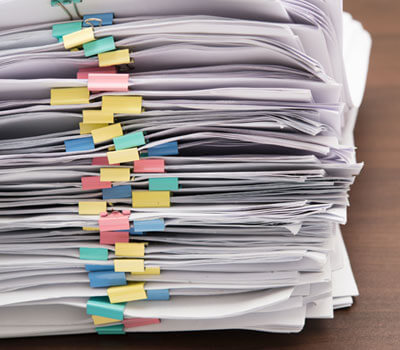Resources : Managing Your Records
Save, shred or recycle? Managing your documents safely

What do you do with junk mail, or old utility bills? We all hate to see paper go to waste, so you might want to recycle unneeded documents. However, it’s important to make sure you’re not putting your personal information at risk. While we are all concerned about online identity theft and fraud, there is still a risk that someone will take advantage of your information the old-fashioned way, by going through your trash.
Consider reducing mail at the source by signing up for the paperless option with your creditors and financial institutions. That way you can view your statements and bills through a secure log-in, and reduce the amount of sensitive information that arrives by postal mail. For those documents you do receive in paper form, here’s a brief guide to saving what you need to, and shredding what you ought to:
Shred immediately
- Unnecessary documents containing sensitive information such as account numbers, birthdates, passwords, addresses, medical information or other personally identifiable information.
- Any offers of credit that you didn’t specifically request.
Keep as needed, then shred
- Tax records: Keep tax returns forever, and save the supporting documentation for at least three years. The IRS can audit you for any reason within three years, or up to six years if you under-reported gross income by 25% or more. Consider keeping these records six years to be more conservative. If you failed to file a return in any year, you should keep records indefinitely.
- Bank statements: If the records relate to taxes, home improvements or mortgage, keep them as long as needed. For example, records of home improvements should be kept until the house is sold, plus seven years after the corresponding tax return is filed. For information on specific bank records to keep, see On the Record: Which account documents do you need to save?
- Pay stubs: Keep these for one year, reconcile with W-2, then shred.
- Credit card statements: Keep for six months, unless you need them longer to document proof of purchase, or for tax or business reasons. Shred these when no longer needed.
- Routine bills: Keep as needed if pertinent to taxes or business, otherwise shred after confirming payment.
- Medical records: Keep medical bills and insurance documents for three years in case a dispute over payment arises, then shred. Keep information about your medical history and treatment indefinitely.
Financial Quote of the Week
“The stock market is a device to transfer money from the impatient to the patient.”
—Warren Buffet
![]() 4030 Moorpark Ave, Suite 250, San Jose, CA 95117 | Map It
4030 Moorpark Ave, Suite 250, San Jose, CA 95117 | Map It
![]() info@empowermentfinance.com
info@empowermentfinance.com
Serving Northern California, the San Francisco Bay Area, and the South Bay
Silicon Valley, Santa Clara, Sunnyvale, San Jose, Mountain View, Los Gatos, Campbell, Los Altos
Investment advice offered through Empowerment Financial Guidance, LLC, a registered investment advisor.



